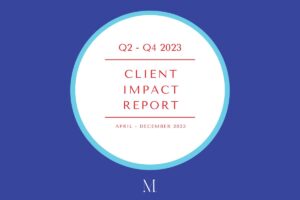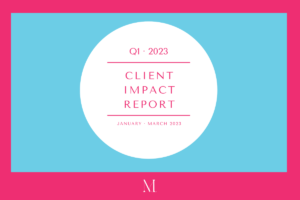 Last week, I received an email from Jennifer, a fellow UMBC alumna and entrepreneur:
Last week, I received an email from Jennifer, a fellow UMBC alumna and entrepreneur:
“I have a question about your post-grad experience: Did you ever feel frustrated and worried you’d never achieve your future goals? How did you deal with that while you were trying to establish yourself as an adult out of school?
Do you ever feel frustrated or worried you’ll never achieve your future goals?
Yes. It would be too much to say that I’m frustrated and worried all the time, but I worry a lot.
Although I have a lot of friends doing wildly different things with their lives, one common thread I notice in our conversations is the persistent weight of anxiety. What are we so worried about? Or is anxiety just part of being an adult? I recently talked about this with a friend: why don’t we feel like we’re doing enough? Why do we feel like there should be… more? Is there such thing as being content? Is it okay to be “good enough” at something, instead of super amazing at it?
You’re not the only millennial worrying
It turns out that high levels of anxiety are common among millennials. The combination of our propped up self-esteem + an increasingly competitive economy + the ability to compare ourselves to every other millennial on the Internet has led to dauntingly high expectations of life. “Experts agree that the high hopes and heightened ambition of the millennial generation have led many of us to despair, depression, high anxiety, and a wide gulf of meaning in our personal lives,” notes Katherine Schreiber in Expectation Hangover: The Real Reason Millennials Are Disappointed With Life. “Failing to land your dream job, getting rejected from your top choice school, or approaching your 30th birthday with no prospect of knot tying in sight can lead to these let-downs… [b]ut so can checking off all of the above only to feel meh—like something’s still missing.” Does this resonate with you? We’re damned if we do and damned if we don’t. Yikes.
As Molly Sprayregen puts it in The Brain on 23, “we zone out in grad school classrooms or type away in junior offices or teach English in Rwanda, all the while wondering if we are supposed to be somewhere else…. We have few obligations, yet we are always stressed, wondering if life will ever be more certain.” Things were more clear in school, when the next step was fed to us (high school! college!) and we received grades for completed assignments. Learning to run a career is very different. There’s no external structure and no syllabus, and there seem to be a lot of people our age doing much better at it than we are.
Molly again: “when a friend does something as simple as cooking a food more complex than pasta, we applaud her, yet we berate ourselves for not yet having a corner office or a bestselling memoir or a thriving startup.” We have very high expectations of ourselves and our futures. Yet when it comes to doing those things, we realize how much time, energy, and money they take. It’s easy to worry that we’ll never write that novel, start that company, or travel to that country because we have to work our jobs and cook quinoa and get enough sleep. It’s easy to worry that we’re not doing the right things, and that we’re squandering our precious youth working long hours instead of building the next Pokemon Go. Double yikes.
Are you suggesting I lower my expectations?
No. I don’t think having “high hopes and heightened ambitions” is the problem. It’s exhilarating to create lofty goals and work towards achieving them! We have unprecedented access to knowledge, people, and resources – it is an exciting time to be alive. But these endless possibilities can lead to option paralysis. So what do we do? We learn and practice how to manage our expectations better.
Ways to deal with worry and woe
Thankfully, there are many things we can do besides Netflixing and drinking to manage our anxiety.
- Talk to people. Whether peers (solidarity and commiseration) or parents (perspective and comfort), it helps to talk. Sometimes conversations with peers become an echo chamber (aaaahhh we’re all freaking out!) but it helps to know you’re not alone.
- Write. If you have a billion awesome ideas but not a billion hours, write down your ideas. Get them out of your head. Put them on a physical or digital “someday, maybe” list so your brain knows you’re keeping track of them. I use 2Do to keep track of my ideas.
- Plan. If it’s important to achieve goals methodically, plan them. I love the way my friend Lauren does it.
- Therapy. Seeing a therapist has really helped me manage anxiety. There are professionals out there who are anxiety management experts.
- Meditation. I KNOW I KNOW I KNOW will everyone please shut up about meditation? That was my attitude until about a month ago, when I downloaded the app Insight Timer and started listening to guided meditations. They’ve really helped me be less anxious, more compassionate, and more grateful for the things that are going well in my life.
- Help others. The science is in that shows why helping others makes us feel good. A dose of altruism can go a long way to giving us perspective and meaning.
Do you want to do all the things?
My dad once asked, “why do you want to do all these things? Do you think they will make you happy?” It’s a good question. A lot of times humans think, “I’ll be happy once I achieve X,” and that’s a backwards way to go about it. But your answer might be, “I want to do these things because they sound awesome!” Our ideas are precious. They are our unique contribution to the world. How can we choose some and forsake others when we love them all?
Our resources are limited. Time and energy must be budgeted. We do ourselves a service when we view our ideas with curiosity rather than attachment. Not all of our ideas are good ideas, and we must decide which ones deserve our attention and energy, right now. The others can wait. As noted above, keep them in a notebook or spreadsheet so that your brain knows they’ve been captured, then put them on the back burner. We won’t do all of them, and that’s not failure: in fact, saying no is an important part of success.
You have your whole life to do stuff
When I graduated from university, I thought I had to do everything interesting before turning 30/becoming a parent. That meant moving to Latin America (an idea I have since let go), traveling to multiple countries, starting a business, making six figures, writing books, living alone, living with roommates, getting married, and more. It was stressful.
Thankfully, my friend Julie set me straight. She had her first child in high school, and went on to complete college, graduate school, and law school while parenting her daughter. It wasn’t until many years later that her husband joined the Foreign Service and they started living internationally. While visiting Julie and co. in Armenia, Julie pointed to an elderly couple at the U.S. base where we were celebrating the 4th of July. “See that couple?” she said. “They waited until they retired to join the Peace Corps. You don’t have to stop doing cool things just because you’re old, or because you have kids, and you don’t have to do everything cool before then, either!” What a relief to hear.
Jennifer, thank you for reaching out and asking if I feel frustrated or worried about achieving future goals. The answer is yes. A lot of us struggle with frustration and worry, and are learning to manage our expectations. You’re not alone on this bus.
(Image by William Iven)







